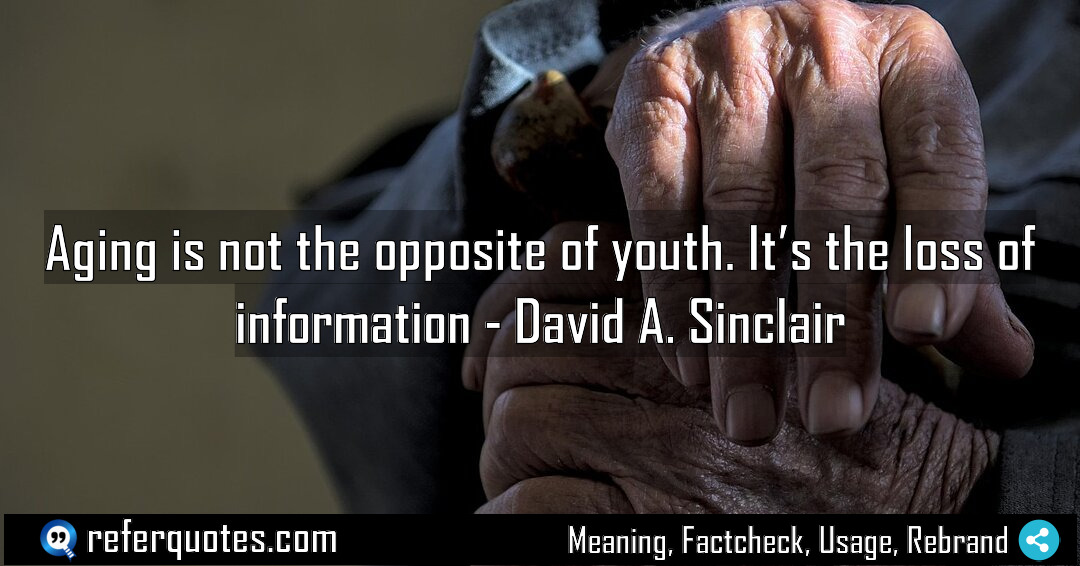
You know, when David Sinclair says “Aging is not the opposite of youth,” he’s flipping the script on how we see getting older. It’s not about gaining wrinkles, it’s about our cells losing their instruction manual. This perspective completely changes the game for longevity research.
Share Image Quote:
Table of Contents
Meaning
The core idea here is that aging isn’t a separate state from youth, but rather the gradual decay of the biological information that keeps our bodies young and functioning properly.
Explanation
Okay, so think of it this way. We’re taught that youth and old age are two different teams, you know? But Sinclair argues they’re on the same team, just at different points in the game. Youth is when your cells have a perfect, crisp copy of the “instruction manual” – your DNA and its associated epigenetic markers. Aging is simply the process of that manual getting worn out, coffee-stained, and pages getting lost. The information degrades. The *instructions* for being healthy and vibrant get corrupted. It’s a loss of information, not a gain of some “old” substance. This is a profoundly different way to look at it because if aging is just information loss, then in theory, it’s reversible. You just need to find a way to reboot the system and restore the data.
Quote Summary
Reading Level85
Aesthetic Score82
Origin & Factcheck
This quote comes directly from David A. Sinclair’s 2019 book, Lifespan: Why We Age—and Why We Don’t Have To, which was published in the United States. It’s a central thesis of his work, not just a passing remark. You sometimes see similar ideas floating around, but this specific phrasing is Sinclair’s.
Attribution Summary
Where is this quotation located?
| Quotation | Aging is not the opposite of youth. It’s the loss of information |
| Book Details | Publication Year: 2019; ISBN: 978-1501191978; Last edition: 2020; Number of pages: 432. |
| Where is it? | Chapter 2: The Information Theory of Aging, Approximate page 63 from 2019 edition |
Context
In the book, he’s building his case for what he calls the “Information Theory of Aging.” He’s arguing against the idea that aging is just the accumulation of damage, like a car rusting. He’s saying it’s more like a software glitch in the car’s computer—the hardware is fine, but the code is buggy. The body forgets how to be young because the epigenetic information that tells it how has been degraded.
Usage Examples
I find this quote is incredibly powerful for a few different audiences. For my team in biotech, it’s our north star—it frames our entire research approach around information restoration, not just damage repair. For a general audience, it’s a mind-opener. You can use it to explain why lifestyle choices like diet and exercise matter; they’re not just “staying healthy,” they’re helping to preserve your biological data. And for anyone feeling anxious about getting older, it reframes aging from a predetermined fate to a potentially malleable process. It gives a sense of agency.
To whom it appeals?
Share This Quote Image & Motivate
Motivation Score70
Popularity Score72
Shareability Score75
FAQ
Question: Is this just a metaphor, or is it a real scientific theory?
Answer: It’s a bona fide, testable scientific hypothesis that Sinclair and others are actively researching. The “information” he refers to has a specific biological basis in our epigenome.
Question: What kind of “information” is being lost?
Answer: Primarily epigenetic information. Think of it as the software that runs on the hardware of your DNA. It tells a skin cell to be a skin cell and a liver cell to be a liver cell. As we age, these signals get noisy and cells forget their identity.
Question: If it’s just information loss, does that mean we can stop aging completely?
Answer: In theory, the framework suggests it could be slowed, halted, or even reversed. In practice, we’re a long, long way from that. But this perspective opens up entirely new avenues for research that the old “damage accumulation” model didn’t.
Similar Quotes
You know, when David Sinclair says “Aging is a loss of information,” he’s flipping the script on how we see getting older. It’s not about time running out, but about…
You know, the biology of aging is the biology of information loss. It’s a game-changing way to see getting older not as wear and tear, but as a system losing…
You know, when David Sinclair says “Youth is not a phase; it’s a pattern,” he’s flipping the script on everything we thought we knew about aging. It’s not an inevitable…
You know, when David Sinclair says “Aging isn’t a failure of the body,” he’s completely flipping the script. It’s not about our biology letting us down, but about our own…
We don’t have to accept aging as inevitable. It’s a radical shift from thinking we’re just passengers on the aging train to realizing we might be the engineers. This quote…
